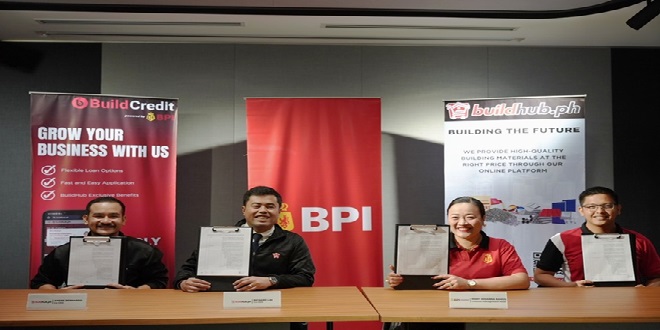
BuildHub PH, an online marketplace dedicated to the construction industry, has partnered with the Bank of the Philippine Islands (BPI) to provide construction businesses with access to credit lines of up to ₱30 million, including collateral-free options. This initiative, launched on September 10, 2024, at BPI’s Ayala Triangle Gardens office, aims to enhance financing opportunities for hardware stores and contractors across the country through BPI’s Ka-Negosyo Credit Line (KCL).

The collaboration was formalized with a Memorandum of Agreement (MOA), marking a pivotal step in delivering innovative financial solutions to the construction sector. Through KCL, BuildCredit users with active accounts for at least 12 months can secure credit lines of up to ₱30 million without needing collateral. This support is crucial for contractors to complete projects and allows hardware stores to finance their inventory and expand their operations. KCL is conveniently accessible via BPI Online, BPI BizLink, the BPI mobile app, and BPI debit card, enabling clients to manage their accounts, pay bills, transfer funds, and access ATM services easily. Applicants are only required to submit minimal documentation, such as a valid ID and DTI registration.
Additionally, BuildCredit offers competitive interest rates ranging from 1% to 3% for 30 to 60-day terms, fostering stability and growth for small and medium-sized construction businesses. This partnership is expected to empower SMEs within the construction sector, promoting innovation and business expansion by easing access to capital.
BPI Business Banking Head Dominique Ocliasa highlighted the importance of supporting SMEs in construction, stating, “At BPI, we are committed to empowering SMEs across all sectors, including small businesses in construction. Our partnership with BuildHub PH aligns with our dedication to providing innovative financial solutions that drive growth. Through our collaboration, we enable contractors, hardware stores, and businesses to access top-quality construction materials with ease and convenience. This partnership underscores our goal to support the digital transformation of SMEs, helping them build and realize their business goals with greater confidence and efficiency in a rapidly evolving market.”
Key representatives from both organizations were present at the signing ceremony, including BPI’s Mary Jhoanna Ramos and Joseph W. Orillo, along with BuildHub PH’s Co-CEOs Richard Lim and Andre Bernardo, and other executives.
Andre Bernardo, Co-CEO of BuildHub PH, noted, “By merging BPI’s financial expertise with BuildHub’s tech-driven solutions, we’re addressing a critical gap in the construction industry—access to timely and flexible capital. This partnership empowers businesses to move faster and smarter, unlocking new opportunities for growth and efficiency.”
Richard Lim Jr., Co-CEO of BuildHub PH, added, “Our partnership with BPI opens up significant capital for our users without the traditional barriers, such as collateral, that often hinder growth. This initiative will fuel business expansion and enhance the overall competitiveness of the construction industry in the Philippines.”
BPI also supported BuildHub PH during its participation in the Philippine Construction (PhilCon) Mindanao Expo from September 5-7, 2024. This collaboration reaffirmed their shared commitment to driving growth and innovation in the construction sector, with BuildHub showcasing its latest tech-driven solutions, including BuildCredit and the Seller Dashboard, designed to streamline logistics and financial management for construction businesses.
As the sole tech-driven distributor at PhilCon Mindanao, BuildHub PH demonstrated its commitment to addressing industry challenges through digital innovation, particularly in key regional markets like Davao. Mark Peńafiel, BuildHub’s Chief Technology Officer, stated, “Our presence at PhilCon Mindanao is part of our ongoing commitment to innovation and regional expansion. The solutions we offer simplify the challenges businesses face, especially in regions like Davao, where demand for tech-driven advancements is growing.”






